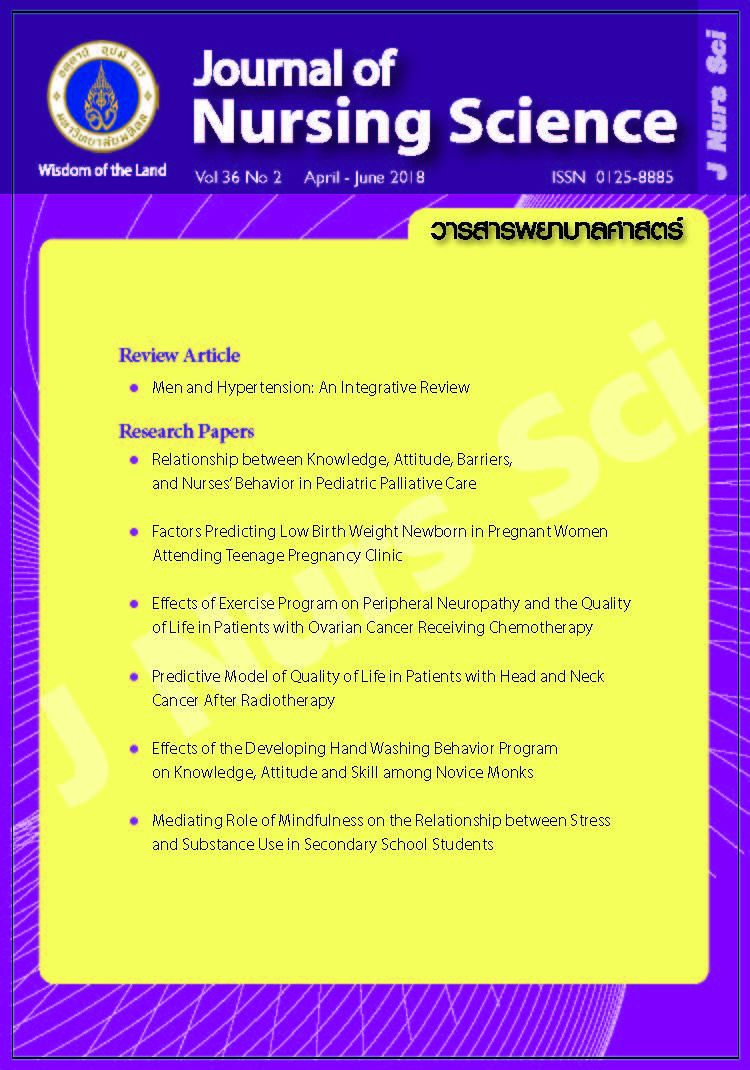Mediating Role of Mindfulness on the Relationship between Stress and Substance Use in Secondary School Students
Main Article Content
Abstract
Purpose: To test the mediating effect of mindfulness on the relationship between stress and substance use in secondary school students.
Design: Descriptive study.
Methods: Simple random sampling was employed to recruit 233 secondary school students. Students were asked to complete 4 questionnaires including general information questionnaire, Perceived Stress Scale, Mindful Attention Awareness Scale, and the Alcohol, Smoking and Substance Involvement Screening Test. The reliabilities of the questionnaires were .78, .85 and .89, respectively.
Main findings: The results revealed that stress had a negative direct effect on mindfulness (β = -.46; p < .02) and positive direct effect on substance use (β = .16; p < .05). Mindfulness had a negative direct effect on substance use (β = -.25; p < .001). Moreover, mindfulness mediated the relationship between stress and substance use in secondary school students.
Conclusions and recommendations: Mindfulness mediated the relationship between stress and substance use in secondary school students. Findings from this study provided the information related to the mediating effect of mindfulness on the relationship between stress and substance use, which is important to develop appropriate plans of care and intervention aimed at reducing the effect of stress on substance. Therefore, mindfulness based intervention can be beneficial in terms of preventing secondary school students from substance use.
Article Details
Copyright Notice: Nursing Science Journal of Thailand has exclusive rights to publish and distribute the manuscript and all contents therein. Without the journal’s permission, the dissemination of the manuscript in another journal or online, and the reproduction of the manuscript for non-educational purpose are prohibited.

Disclaimer: The opinion expressed and figures provided in this journal, NSJT, are the sole responsibility of the authors. The editorial board bears no responsibility in this regard.
References
2. Uratanamnee S, Lerdsamran S. Stress anxiety and depression of high school teenager in preparation for university admission. The Journal of Psychiatric Nursing and Mental Health. 2017;31(2):78-94. (in Thai).
3. Sripongwiwat S, Bunterm T, Ngang TK. An investigation of learning stressors among secondary school students: a case study in northeast Thailand. Kasetsart Journal of Social Sciences. 2017 Jun 9;1-10. doi.org/10.1016/j.kjss.2017.06.002.
4. Marshall EJ. Adolescent alcohol use: risks and consequences. Alcohol Alcoholism. 2014;49(2):160-4.
5. Swahn MH, Ali B, Palmier J, Tumwesigye NM, Sikazwe G, Twa-Twa J, et al. Early alcohol use and problem drinking among students in Zambia and Uganda. J Public Health Afr. 2011 Sep 5;2(2):e20. PubMed PMID: 28299061.
6. Levy S, Sherritt L, Gabrielli J, Shrier LA, Knight JR. Screening adolescents for substance use-related high-risk sexual behaviors. J Adolesc Health. 2009;45(5):473-7.
7. Baskin-Sommers A, Sommers I. The co-occurrence of substance use and high-risk behaviors. J Adolesc Health. 2006;38(5):609-11.
8. Pettit ML, DeBarr KA. Perceived stress, energy drink consumption, and academic performance among college students. J Am Coll Health. 2011;59(5):335-41.
9. Bowen S, Witkiewitz K, Clifasefi SL, Grow J, Chawla N, Hsu SH, et al. Relative efficacy of mindfulness-based relapse prevention, standard relapse prevention, and treatment as usual for substance use disorders: a randomized clinical trial. JAMA Psychiatry. 2014;71(5):547-56.
10. Karyadi KA, VanderVeen JD, Cyders MA. A meta-analysis of the relationship between trait mindfulness and substance use behaviors. Drug Alcohol Depend. 2014;143:1-10.
11. Tarantino N, Lamis DA, Ballard ED, Masuda A, Dvorak RD. Parent-child conflict and drug use in college women: a moderated mediation model of self control and mindfulness. J Couns Psychol. 2015;62(2):303-13.
12. Lazarus RS, Folkman S. Stress, appraisal, and coping. New York: Springer Publishing; 1984.
13. Witkiewitz K, Bowen S, Harrop EN, Douglas H, Enkema M, Sedgwick C. Mindfulness-based treatment to prevent addictive behavior relapse: theoretical models and hypothesized mechanisms of change. Subst Use Misuse. 2014;49(5):513-24.
14. Bowen S, Enkema MC. Relationship between dispositional mindfulness and substance use: findings from a clinical sample. Addict Behav. 2014;39(3):532-7.
15. Cohen J. Statistical Power Analysis for the Behavioral Sciences. 2nd ed. Hilsdale, NJ: Lawrence Erlbaum Associates; 1988.
16. Cohen S, Kamarck T, Mermelstein R. A global measure of perceived stress. J Health Soc Behav. 1983;24(4):385-96.
17. Wongpakaran N, Wongpakaran T. The Thai version of the PSS-10: an investigation of its psychometric properties. Biopsychosoc Med. 2010 Jun 12;4:6. doi: 10.1186/1751-0759-4-6. PubMed PMID: 20540784; PubMed Central PMCID: PMC2905320.
18. Brown KW, Ryan RM. The benefits of being present: mindfulness and its role in psychological well-being. J Pers Soc Psychol. 2003;84(4):822-48.
19. Black DS, Sussman S, Johnson CA, Milam J. Psychometric assessment of the Mindful Attention Awareness Scale (MAAS) among Chinese adolescents. Assessment. 2012;19(1):42-52.
20. Christopher MS, Charoensuk S, Gilbert BD, Neary TJ, Pearce KL. Mindfulness in Thailand and the United States: a case of apples versus oranges? J. Clin Psychol. 2009;65(6):590-612.
21. Humeniuk RE, Henry-Edwards S, Ali RL, Poznyak V, Monteiro M. The Alcohol, Smoking and Substance Involvement Screening Test (ASSIST): manual for use in primary care. Geneva: World Health Organization; 2010.
22. Tantirangsee N. A study of validity of the Brief-Alcohol, Smoking, Substance Involvement Screening Test (Brief - ASSIST) and effectiveness of the Brief – ASSIST – Linked Modified Brief Intervention (MBI) among schizophrenic spectrum patients with comorbid substance use disorders [Internet]. Songkhla: Songkhla Rajanagarindra Psychiatric Hospital, Departments of Mental Health, Ministry of Public Health; 2015 [cited 2017 Sep 9] Available from http://www.i-mapthailand.org/site/media/admin_imap/Abstract/Abstract%20-%20ASSIST_Link_BI.pdf. (in Thai).
23. Baron RM, Kenny DA. The moderator-mediator variable distinction in social psychological research: conceptual, strategic, and statistical considerations. J Pers Soc Psychol. 1986;51(6):1173-82.
24. Leonard NR, Gwadz MV, Ritchie A, Linick JL, Cleland CM, Elliott L, et al. A multi-method exploratory study of stress, coping, and substance use among high school youth in private schools. Front Psychol. 2015;6(1028):1-16.
25. Hj Ramli NH, Alavi M, Mehrinezhad SA, Ahmadi A. Academic stress and self-regulation among university students in Malaysia: mediator Role of mindfulness. Behav Sci (Basel). 2018 Jan 15;8(1). pii: E12. PubMed PMID: 29342910.
26. Kabat-Zinn J. Mindfulness-based interventions in context: past, present, and future. Clin Psychol-Sci Pr. 2003;10(2):144-56.


